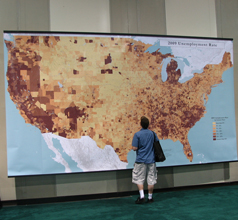Honest, paywall-free news is rare. Please support our boldly independent journalism with a donation of any size.
The Obama administration came out with its first set of numbers on the jobs impact of its stimulus package. It’s pretty much along the lines of what was predicted. To date, the package has created close to one million jobs. That is good news, but in an economy with more than 15 million unemployed workers, it is not nearly good enough. We need to do more, much more.
Fortunately, there is an easy and quick way to begin to get these unemployed workers back to work. It involves paying workers to work shorter hours. The mechanism can take the form of a tax credit to employers. The government can give them a tax credit of up to $3,000 in order to shorten their workers’ hours while leaving their pay unchanged. The reduction in hours can take the form of paid sick days, paid family leave, shorter workweeks or longer vacations. The employer can choose the method that is best for her workers and the workplace.
If take-home pay is left unchanged as a result of the credit, then demand should be left unchanged. If workers are on average putting in fewer hours and demand is unchanged, then employers will need to hire more workers.
This logic is about as simple as it gets. The process is also quick and cheap. In principle, the government can go this route to save jobs at a cost of a bit more than $20,000 per job, far less than the estimates of the cost per job under the administration’s stimulus package.
We don’t even have to speculate about whether this sort of short-hours arrangement can work. Germany put a short-hours program in place at the start of its recession. Its unemployment rate today is 7.6 percent, about the same as the unemployment rate it had going into the recession. Imagine that workers in the United States, like workers in Germany, were dealing with the recession by putting in four-day weeks (while getting paid for five) or getting an extra two weeks a year of paid vacation. This sure beats being unemployed or being threatened with unemployment.
Seventeen states already have a “work-share” program in place that allows employers to use unemployment insurance money to cover a reduction in work hours, without a corresponding reduction in pay. More than 100,000 layoffs have been prevented as result of this program.
Sen. Jack Reed of Rhode Island has a bill that would increase funding for work-share programs and remove some of the bureaucracy that makes it difficult for employers to take full advantage of the programs that currently exist. The bill would also provide start-up money for the states that do not have work-share programs.
The Reed bill would be a big step towards following the Germany model, taking advantage of a program that is already in place. It could very quickly make a big dent in the unemployment rate, by preserving many of the jobs that are now being lost.
In this respect, it is important to clear up a common confusion about the economy. Every month, we get a figure from the Labor Department for the new jobs created or lost. However, this is a net figure. Approximately four million people leave their jobs every month, about half of these workers, or two million, lose their jobs involuntarily. If the economy creates more than four million new jobs, then we will have a positive jobs figure for the month. If the economy creates less than four million new jobs, then the Labor Department will report that the economy lost jobs in the month.
Suppose that this work-share program reduced the number of people who lose their jobs involuntarily by 20 percent, or 400,000 workers per month. This would have the same effect to our job count as adding 400,000 additional new jobs. If this rate could actually be maintained over a full year, then it would imply that the economy would generate nearly five million new jobs.
All the projections show that the unemployment rate is likely to continue to rising for the immediate future and remain high for years to come. The Congressional Budget Office projects that the unemployment rate will average 10.2 percent next year and even in 2011 it will average 9.1 percent. If this projection proves accurate, it would be a disastrous scenario for tens of millions of people.
There are quick and effective ways to increase employment, with shorter hours at the top of the list. Making tens of millions of people suffer for economic mismanagement and the greed of the bankers is not acceptable. We must do something.
Trump is silencing political dissent. We appeal for your support.
Progressive nonprofits are the latest target caught in Trump’s crosshairs. With the aim of eliminating political opposition, Trump and his sycophants are working to curb government funding, constrain private foundations, and even cut tax-exempt status from organizations he dislikes.
We’re concerned, because Truthout is not immune to such bad-faith attacks.
We can only resist Trump’s attacks by cultivating a strong base of support. The right-wing mediasphere is funded comfortably by billionaire owners and venture capitalist philanthropists. At Truthout, we have you.
Truthout has launched a fundraiser to raise $41,000 in the next 7 days. Please take a meaningful action in the fight against authoritarianism: make a one-time or monthly donation to Truthout. If you have the means, please dig deep.
